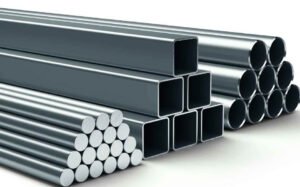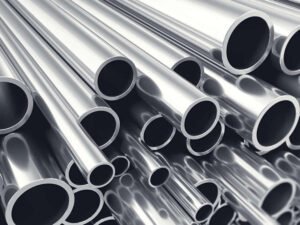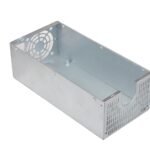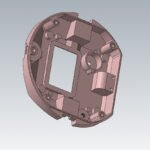Introduction
Aluminum continues to be one of the most used materials across industries. And the reasons are quite simple. Aluminum showcases an impressive strength-to-weight ratio and has excellent relative machinability. However, you might have to do some due diligence to choose a suitable aluminum alloy. Since most projects will require 6061 or 7075 aluminum alloy, we will discuss them inside and out in this post. So, which aluminum alloy is best for your upcoming project? Let’s find out, shall we?
What is 6061 aluminum alloy?
A renowned member of the 6000 series, 6061 aluminum alloy is often regarded as the jack of all trades. Why? The 6061 aluminum alloy showcases excellent mechanical properties, corrosion resistance, and versatility.
Not just that, the sheer low cost of preparation also makes it highly lucrative for different projects.
6061 is the most versatile heat-treatable aluminum alloy that was developed in 1935. It was initially called ‘Alloy 61S’. 6061 aluminum alloy is easy to fabricate and exhibits excellent formability.
Speaking of its formation, the 6061 aluminum alloy is made of 95.8 to 98.6 percent aluminum, 0.8 to 1.2 percent magnesium, and 0.4 to 0.8 percent silicon. Such alloys usually show traces of copper, chromium, and other elements.
We will discuss the mechanical and chemical properties of 6061 aluminum alloy in a moment. But before we do that, let’s discuss the areas and fields where you can use this popular aluminum alloy.

What are 6061 aluminum alloy applications?
Since 6061 is highly versatile in its properties as well as applications, you can use it to fulfill any structural requirement. You will always find vehicles, both personal and commercial, using the 6061 aluminum alloy. The alloy is mainly used to build frames and running boards.
Not just that, you will find ample areas of application of 6061 aluminum alloy in infrastructure as well. The allow finds application in structuring mass transit and subway platforms. You will often find 6061 aluminum alloy on steps, walkways, cover plates, and even on floors.
We have also found its applications across consumer goods! Most modern bicycle brands use 6061 aluminum alloy to develop the frame and related components. It is even used in SCUBA tanks, small boats, and fishing reels! After all, the alloy has immense strength to undergo high stress and hot forging.
What is 7075 aluminum alloy?
Right after the development of the 6061 aluminum in 1935, a Japanese company came out with the 7075 aluminum alloy in 1936. The alloy was later made available for industrial application in 1943 by Alcoa, an aluminum supplier.
7075 aluminum alloy, a member of the 7000 series, is known for its high strength and impressive strength-to-weight ratio. It showcases commanding mechanical properties, which we will discuss in a moment. Most importantly, this aluminum alloy has superb resistance to fatigue and good ductility. No wonder why it is used to build structural parts of an aircraft.
The 7075 aluminum alloy contains zinc (5.6 to 6.1 percent), magnesium (2.1 to 2.5 percent), and copper (1.2 to 1.6 percent). Besides them, the alloy also contains silicon, titanium, chromium, manganese, iron, and other elements. Let’s discuss its applications!
Where is 7075 aluminum alloy used?
This is a no-brainer. Given the high strength-to-weight ratio and overall improved strength, the 7075 aluminum alloy is well equipped to handle the high stress across aerospace, marine, and transportation industries.
These industries require building materials that are lightweight and showcase high-strength properties. And 7075 aluminum alloy qualifies quite easily. You will find this alloy being used by high-end bicycle brands. Airframes and rifles utilize the 7075 aluminum alloy as well.
7075 is often regarded as ‘aircraft grade’ because it is one of the highest strength aluminum alloys used in the industry. Its applications never cease across aircraft, missiles, spacecraft, and other defense-related products.

Mechanical differences between 6061 and 7075 aluminum
Let’s continue our discussion about the mechanical properties of the aluminum alloys in question. Here are the mechanical properties you will want to consider when choosing between 6061 and 7075 aluminum alloys:
1. Thermal conductivity
Aluminum alloys never disappoint when it comes to heat conductivity. They are generally great conductors of heat. However, 7075 and 6061 aluminum alloys have quite a difference in their thermal conductivity. 6061 aluminum alloy has a higher thermal conductivity than 7075 aluminum. So, you will want to use 6061 aluminum if heat dissipation is the primary purpose.
2. Elasticity
Elasticity is the measure of a material’s stiffness. In other words, you will want to check the material’s resilience before putting it to use. Elasticity will also help you identify the material’s resistance to deformation. The good thing is that both 6061 and 7075 aluminum alloys have similar elasticity.
3. Electrical resistivity
A low electrical resistivity means the material has good electrical conductivity and vice versa. Speaking of the aluminum alloys in question, you will find that both 7075 and 6061 aluminum have excellent electrical conductivity. But, 6061 aluminum has lower electrical resistivity than 7075. So, you will want to use it if you need a material with high electrical conductivity.
4. Corrosion resistance
7075 aluminum is more prone to corrosion because it contains a higher percentage of copper. Copper usually reacts quickly with the environment and causes corrosion.
5. Yield strength
Yield strength is essentially a material’s ability to withstand pressure and impact without deformation. 7075 aluminum alloy has higher yield strength than 6061 aluminum. The former’s yield strength is higher due to the higher percentage of zinc. However, 6061 doesn’t have a bad yield strength. It has a yield strength of 276MPa.
6. Temperature resistance
Temperature resistance is the measure of a material’s ability to withstand heat without causing deformation. In other words, you will want to know the melting points of both the alloys before you decide which one to use for your project. 7075 aluminum (477 – 635 degrees Celcius) has a lower melting point than 6061 aluminum (582 – 652 degrees Celcius). Thus, 6061 aluminum alloy is perfect for projects that undergo high heat treatment.
7. Material hardness
The harder a material, the higher its chances to fight indentation, penetration, and other deforming forces will be. Material hardness is a significant factor when it comes to choosing between 6061 and 7075 aluminum alloys. To be precise, 7075 aluminum alloy is harder than 6061 aluminum.
Chemical differences between 6061 and 7075 aluminum
One would also be interested in the chemical differences between the two important aluminum alloys. Indeed, the chemical differences between 6061 and 7075 aluminum alloys aren’t readily visible. But, you will still want to consider them.
Why? The availability of elements like magnesium, silicon, copper, iron, zinc, titanium, manganese, and chromium have a significant impact on the alloy’s weldability and workability. To be specific, you will want to know the percentage of zinc in each alloy.
Since 6061 contains less zinc than 7075, you will find it easier to weld 6061 aluminum alloy than 7075. It will also have superior workability. At the same time, 6061 will not showcase the high strength and stress resistance of 7075.

Summary: Which alloy to choose between 6061 and 7075?
Both 6061 and 7075 aluminum alloys have impressive mechanical properties. But, you will want to use 7075 if your project requires high strength and low weight material. We suggest you use the 7075 aluminum alloy if the part will undergo a lot of heat and friction since material strength will be the key to project success. Since 7075 is expensive, use the alloy if the cost is less of a concern.
So, when should you use the 6061 aluminum alloy? We highly recommend 6061 aluminum alloy if the part requires a lot of machining and welding. Since 6061 is relatively cheaper, you should go for it if you are running a limited budget. Regardless, to make a good decision, we suggest you list your priorities and specific project requirements. It will help you make comprehensive distinctions between the alloys you are about to use.
Keep reading!
There you have it. We have shared everything you need to know about the two most important aluminum alloys – 6061 and 7075. The differences in material, properties, and applications have been well described in the post, which will help you make a highly informed decision for your project. Have questions? Comment down below. If you loved reading this post, don’t forget to check out other informative posts on the blog!




